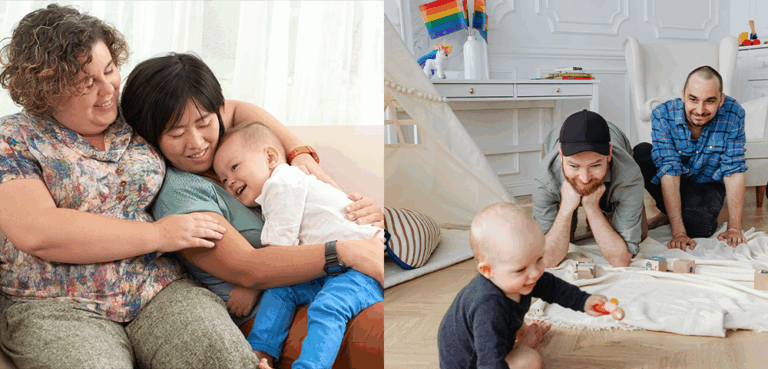
Planning a family with donated sperm

Choosing to start a family is one of the biggest choices a couple can make. IVFAustralia charts the challenges and pitfalls for women couples making this important decision.
The desire to have a family is one of the most fundamental things that affects us all, regardless of how we choose to identify or who we choose to love.
For some, it provides a means of passing on our genes to future generations. For others, It allows them to create a sense of self and identity. For many of us, through the activities of children and education, it involves us to engage more fully in the community that surrounds us.
Reproduction can be a much more complex process for people in the LGBTQI community. It involves seeking the assistance of at least one third party outside your own relationship and it often involves the use of intrusive medical technology, for something that for other people can happen very naturally.
It involves personal and, sometimes deeply sensitive, decision making about whose sperm to use, whose eggs to use and whose uterus will carry the baby.
When women in a same-sex relationship begin thinking about growing their family, the first decisions they will need to make are whose eggs are going to be used, and who is going to carry the baby.
Sometimes one partner will have a strong maternal instinct to carry a child while the other partner is just not as interested. Sometimes, where one partner already has children, it will be more important to the other to go through the fertility process and carry the child herself. In other cases, it may be obvious that one partner has reduced fertility or the other may be a healthier carrier of the baby.
The next step is to identify the sperm donor. This may involve the use of a friend giving sperm to help create or grow a family. A good assumption is that the people in the relationship themselves will usually have normal fertility and simple home insemination with a friend may be a useful approach.
The two issues that need to be considered carefully in planning this are to ensure that the whole process is safe and that you have made the right choice of sperm donor.
Safety involves two aspects – infection and genetics. It is important to ensure, as far as possible, that the risk of transmission of infection through donated sperm is kept as low as possible. It is therefore a good approach in using home insemination to ensure that the sperm donor is regularly checked for sexually transmitted infections.
A major consideration, nowadays is the issue of genetic testing of the donor. It is good advice for all relationships, regardless of sexuality, to consider genetic testing for common recessive gene variants that could cause serious health problems for your child.
It’s a fact of life that all of us carry twenty to thirty variant “bad genes” in our 25,000 genes. These genes are mostly recessive genes.
In other words, they only matter if you and the person who is providing the egg or sperm to create the child are BOTH carrying the same gene. As most of these “bad genes” are very rare, this is normally an unlikely event.
However, some recessive genes are more common. The most common recessive genes include cystic fibrosis, spinal muscular atrophy, thalassaemia and Fragile X. It is therefore well worth ensuring that either you or your donor are tested for this.
Increasingly, however, people are starting to look beyond these four common genes to do more extended genetic testing. For instance, most clinics who run donor sperm banks will already have carried out more extensive testing on their donors, testing up to 500 different genes.
Normally, this will show up one or two rare gene variants for each donor. We would normally recommend, when using a clinic donor, that you have yourself tested for the same genes to avoid the remote chance that any of your own “bad genes” match those of the donor.
However, this is not compulsory, and some women take the view that if they were using a friend as a donor they wouldn’t be doing this sort of detailed genetic testing so they choose not to be tested themselves.
It’s also really important to remember that even extended genetic testing of a sperm donor cannot detect every conceivable genetic problem that can affect your children and you should still go through the normal process of prenatal testing once you are pregnant.
The major consideration in using a friend as a sperm donor is how you want the family to look in the future. In view of the recent High Court case, it is really important that you approach the use of a known donor very carefully. Problems are less likely where there is already a strong friendship between the donor and the recipients – picking a sperm donor off the internet is never a good idea. However, even among close friends, problems can still arise further down the track.
It is very important that everyone involved seeks their own independent legal advice to ensure that the often complex ramifications of changing family circumstances do not harm the family in the future.
A frank and open discussion among all the participants should take place and Stephen Page, the leading family and fertility lawyer, has recommended that all relationships planning on using a known sperm donor should have a properly drafted written agreement in place setting out their future parental intentions.
The recent High Court ruling was important and makes the point that a Family Law Court will look at all parental arrangements based on the normal criteria for parenthood, taking into account biology, intentions and parenting and the ruling makes it clear that just because the original arrangement was a “donation,” that has no effect on what future parental rights and responsibilities may be. As a result, each application for parental status will be judged on its own merits, regardless of whether donated sperm is involved.
It is important to remember that all the court cases so far have been about donors seeking to become parents and parental responsibilities have never been awarded to a sperm donor against his will. It’s also important to remember that, despite these uncertainties, many very happy families have resulted from the use of a known sperm donor. It’s preparation that is the key.
In choosing to use a fertility clinic to have your family, there are a number of different considerations. The big advantage of using a clinic is that the clinic will retain the identity of the donor which provides a protective barrier for your own control of your family.
Nowadays, there is no such thing as anonymous sperm donation. All sperm donors have to have their identity carefully recorded and stored. In some Australian states, this has to be done through a state donor register.
This is very important for the long term welfare of the children. We have had a past generation of people (now young adults) who were conceived through truly anonymous sperm donation and who have suffered greatly as a consequence of being unable to identify their ancestral origins or have any contact with the person from whom they inherited their genetic material.
Sperm donors donating to a clinic, such as ours, very willingly give their sperm, altruistically, to help other people have a family, but may also value an element of future contact with the people that they have helped to create.
However, in the clinic environment, the intending parents remain in control of access to the child until the child reaches adulthood. There has, so far, never been any case where a clinic-recruited sperm donor has applied for and achieved parental status against the will of the existing parents.
The clinic-recruited donor will normally go through careful preparation including medical assessment. Infection testing is carried out both before and after the freeze-storage and quarantining of sperm to ensure that there is no risk of transmission of early incubating infections at the time of sperm collection.
As well as the genetic testing discussed above, careful recording of the donor’s entire family history will allow the future child to know which medical conditions run down both sides of their family tree.
Once a woman is ready to proceed with use of donated sperm, she will be given access to a database to look through the available donors. Clinics vary in their arrangements for this.
At IVFAustralia and our sister clinics Melbourne IVF, Queensland Fertility Group and TasIVF, we provide our patients with access to the database in the period before they start treatment so that the women involved have time to carefully review the donors and choose the one they are most comfortable using to create and grow their families. Sperm donors are normally very generous with their time and will provide quite detailed profiles of themselves, usually including a photograph of themselves as a baby.
The type of treatment itself depends on the circumstances. A normally fertile woman would use artificial insemination rather than IVF as a first step. However, women can suffer from medical conditions that cause infertility. Conditions such as endometriosis, uterine fibroids or a hormonal imbalance may mean that medical treatment is going to be necessary to help you have a family and you may need to do IVF.
A further situation where IVF is often considered by same sex relationships is where one partner plans to use her eggs to create the embryo while the other partner plans to carry the baby. This allows both partners to have a physical involvement in the baby-making process and is an approach that is attractive to many female same-sex relationships.
All of this does seem very daunting but with careful preparation and consensual decision-making between you both, there is no reason at all why women in a same-sex relationship cannot share the full joys of parenthood.
For more information on everything donor related, join us at any of the below info nights or go to www.mivf.com.au/fertility-seminars
MelbourneIVF webinar – Wednesday 28th August – webinar
IVFAustralia webinar – email info@ivf.com.au










